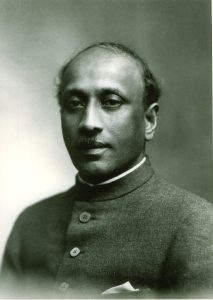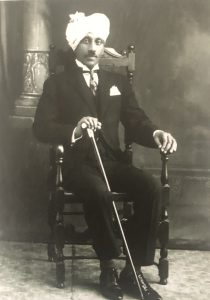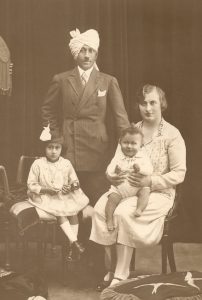 Shaikh-ul-Mashaik Mir Pyarumian Maheboob khan was the five-year younger brother of Hazrat Inayat khan, the poet-philosopher and scholarly musician and mystic.
Shaikh-ul-Mashaik Mir Pyarumian Maheboob khan was the five-year younger brother of Hazrat Inayat khan, the poet-philosopher and scholarly musician and mystic.
When Hazrat Inayat khan made his plans to go to the west, it was crystal clear that Pyaru Maheboob and their cousin brother Mohd. Ali khan followed him on this “Grand tour of the West” (1910). His younger brother Musharaff khan followed them three years later. The brothers were close and united in their musical genius and mystical inwardness.
Maheboob had an exceptional beauty of voice as judged by both Hazrat and later western specialists. He succeeded Hazrat twice in his life. At first in his professorate at the Baroda Gayanshala Academy of Music. Then a quarter of a century later, in 1927, Maheboob succeeded Hazrat as leader of the Sufi Movement formed around Hazrat’s teachings.
 Maheboob khan’s greatest abiding contribution to Hazrat’s Indian Sufism in the West are his compositions for voice and piano accompaniment. A large number of the compositions contained Indian melodies from their Barodan Gayanshala and Maulabakhshi repertoires. Maheboob also created compositions to a number of Hazrat Inayat khan’s English poems were most valued in the Sufi meetings where those were performed. Being averse to commercialisation of a to him sacred art, only a few songs were published, and by others, during his lifetime. The beauty of his music remains profoundly striking.
Maheboob khan’s greatest abiding contribution to Hazrat’s Indian Sufism in the West are his compositions for voice and piano accompaniment. A large number of the compositions contained Indian melodies from their Barodan Gayanshala and Maulabakhshi repertoires. Maheboob also created compositions to a number of Hazrat Inayat khan’s English poems were most valued in the Sufi meetings where those were performed. Being averse to commercialisation of a to him sacred art, only a few songs were published, and by others, during his lifetime. The beauty of his music remains profoundly striking.

In 1924, Maheboob khan was married to Shadibiy, daughter of Ekbal Dawla van Goens – van Beijma, a dedicated Dutch mureed of Murshid. This accounts for his regular shifts from the Hague to Paris and vice versa, and also for his being caught up in Holland by World War II. The couple was blessed with two children: Raheem-u-nissa (1925) and Mahmood (1927).
Maheboob khan died in 1948 in The Hague.
